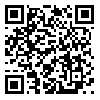BibTeX | RIS | EndNote | Medlars | ProCite | Reference Manager | RefWorks
Send citation to:
URL: http://rehabilitationj.uswr.ac.ir/article-1-1395-en.html

 , Ma'soumeh Pourmohammadreza-Tajrishi *2
, Ma'soumeh Pourmohammadreza-Tajrishi *2 
 , Hojatollah Haghgou3
, Hojatollah Haghgou3 
 , Atabak Vosouqi
, Atabak Vosouqi 
 , Akbar Biglarian4
, Akbar Biglarian4 

2- Pediatric Neurorehabilitation Research Center, Tehran, Iran. ,
3- Department of Occupational Therapy, University of Social welfare and rehabilitation sciences
4- Department of Biostatistics, University of Social welfare and rehabilitation sciences
Objective: This study was aimed to determine the effectiveness of pivotal response training (PRT) on behavioral problems of 4-6 years old children with autism.
Materials & Methods: the present study was a quasi-experimental study with time-series design with two groups. Twelve individuals with autism (3 girls and 9 boys) who were attending in Beautiful Mind Clinic at Tehran in 2012 were selected in convenience and divided equally into experimental and control groups. Experimental group participated in 15 sessions (three times in week) and received pivotal response training, but control group received mainstream programs (consists of applied behavioral analysis,and speech therapy) of the clinic. All children were evaluated by Giliam Autism Rating Scale (GARS) 3 times before and after intervention sessions. Data were analyzed by analysis of covariance.
Results: The results of analysis of covariance analyse showed that stereotyped behaviors and communication skills were reduced in experimental group, but there were no significant difference between experimental and control groups.(P=0.45). Also, findings showed that social interaction of experimental group improved, compared to that of control group (P<0.001).
Conclusion: We can conclude that pivotal response training program has a positive effect on social interaction of children with autism, but there was no significant effect in terms of stereotype behaviours and communication skills.
Received: 16/11/2013 | Accepted: 20/02/2014 | Published: 4/03/2014
| Rights and permissions | |
 |
This work is licensed under a Creative Commons Attribution-NonCommercial 4.0 International License. |



